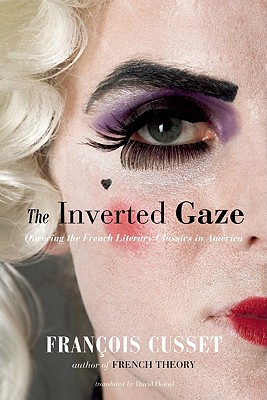 In his new book, Francois Cusset says that: “We need to learn to take the text, turn it over, penetrate it, play with its sex, slip ours into it, follow it to the end of its fine ambivalence, and force it along the way to assume a position.” Finally a writer who shares the same queer biblio-lust as myself! With The Inverted Gaze: Queering the French Literary Classics in America, Cusset presents a new addition to the study of queer theory, dissecting the French literary classics from the point of view of what Cusset calls a “QC” or queer critic.
In his new book, Francois Cusset says that: “We need to learn to take the text, turn it over, penetrate it, play with its sex, slip ours into it, follow it to the end of its fine ambivalence, and force it along the way to assume a position.” Finally a writer who shares the same queer biblio-lust as myself! With The Inverted Gaze: Queering the French Literary Classics in America, Cusset presents a new addition to the study of queer theory, dissecting the French literary classics from the point of view of what Cusset calls a “QC” or queer critic.
It must be noted that this is not a book for the faint of heart and is a highly academic read. I have read a few authors who belong to the French canon that Cusset discusses (most notably Proust and Balzac) but I was not nearly as familiar as I would like to be with the authors and works discussed. I think this book would be most enjoyed by someone who is well versed in the French literary canon. I could also see it being a valuable resource in an academic setting for a class about queer theory, especially in regards to French texts.
The subject of theory can be somewhat dry but Cusset queers his discussion of theory by inserting such metaphors as the use of glory holes to illustrate what it means to look at literature through a queer lens. He says “We are looking for the details that have been ignored, but then take on the sudden tumescent vigor of that which passes through the glory hole.”
One of the things I found most fascinating about the book was Cusset’s take on what makes a work of literature queer. Rather than focusing on what is explicitly queer such as the actual acts of sodomy or lesbian affection, Cusset says that being queer is about the loss of the self, “the art of being where nothing awaits you” and that “the queer approach… loudly proclaims lack of definition as its major virtue.” One of the French authors that Cusset discusses is Baudelaire who has a quote which I particularly enjoyed: “To fuck is to aspire to enter another, whereas the artist never leaves himself.” (From “My Heart Laid Bare”).
Particularly interesting was Cusset’s pondering of what makes queer sex queer: “…The multitude of sophisticated caresses not involving penetration, not to mention the ecstatic pain of unfulfillment– and “To keep inside oneself, at the tip of the penis or the base of the perineum, that primal itch without trying to scratch it (or destroy it) with a harmony of bodies, with the illusion of another: that is the program of queer erotics, perisexual or even masturbatory; a painful caress…”
I also appreciated Cusset’s discussion of what makes for a queer reading of a work rather than a more traditional gay or LGBT interpretation. Cusset says that a traditional gay approach looks at what is most easily understood as being overtly gay and attempts to put it in the category of hetero-normativity while a queer approach to literature looks at what is seedy and underlying in a text, what is inferred and undefined as opposed to the observable and plain. He says that traditional gay studies try “to establish a homo counter-corpus, as canonic in the end as the official corpus” whereas queer studies “does not limit its field of investigation to any pre-established criteria, explicit thematic, or author biography, preferring not the celebration of difference, but rather the insinuation of constant doubt, and the political, playful, and insatiable erosion of the usual borders between homo and hetero.”
Altogether a highly intriguing and academic text which left me pondering over such sentences as: “A finger in your nose, as Roquentin could tell us, is sometimes richer in queer meaning than an entire session of fist fucking.” Amen!

